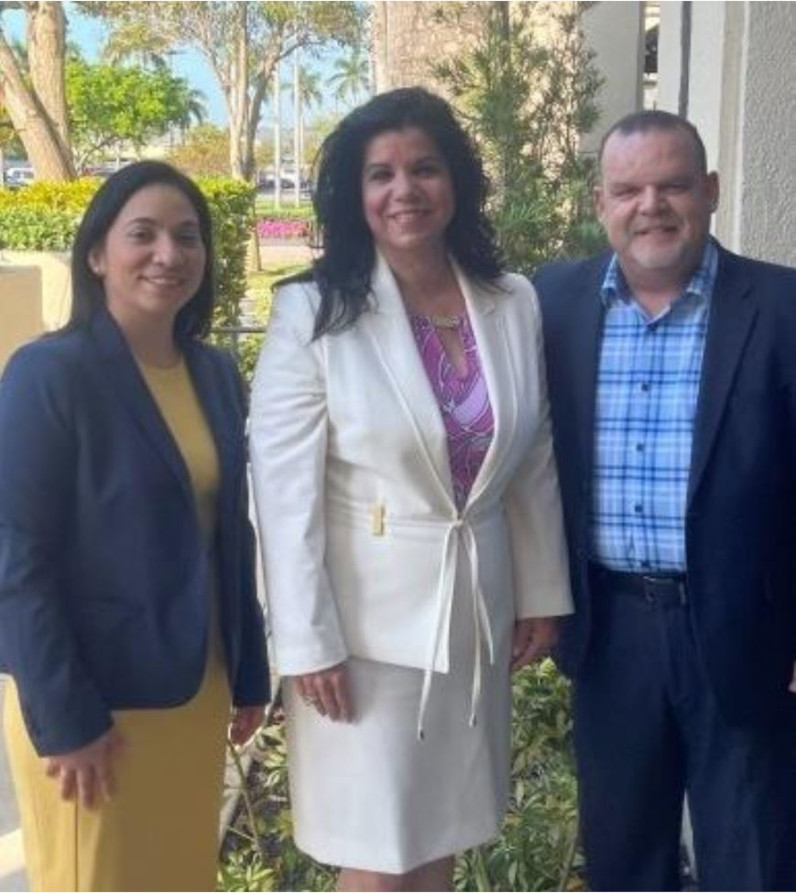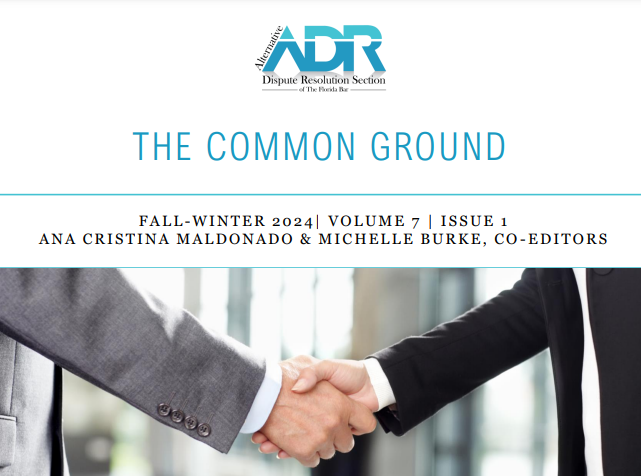by Betsy Vázquez
Vázquez Law, PLLC, Doral
Hispano Collaborative Professionals™, also known as HCP, is a new practice group in the State of Florida of bilingual, Collaboratively-trained professionals, dedicated to serving the Hispanic community and the general public.1 HCP reached a milestone achieving their first Collaborative divorce in Spanish, paving the way for others to follow. What’s unique about HCP is that all of the professionals are fully bilingual (i.e., speak, read, and write) in the Spanish and English language and have a passion to serve the legal needs of the underserved Hispanic community. Currently, 26.2% of Florida residents are of Hispanic or Latino ancestry.2 According to the US Census Bureau, the largest concentrations of Hispanics in Florida are situated in Miami-Dade, Broward, Palm Beach, counties in Southwest Florida, those in the Florida I-4 corridor, and Duval.3 Based on these findings, the Hispanic population would benefit greatly from legal services by bilingual professionals trained in the Collaborative divorce process.

On July 1, 2017, Florida’s Collaborative Law Process Act became law as §61.56 Florida Statute.4 The Florida Supreme Court adopted Florida Family Law Rule of Procedure 12.745, providing Florida family law lawyers with guidance as to how the Collaborative process interacts with the court system.
By laying the foundation, HCP has opened the door for others to resolve their differences in a peaceful, respectful, and dignified way with this unique alternative dispute resolution (ADR) method. Just recently, HCP completed their first Collaborative case in Spanish serving a family that chose the Collaborative Law Process for their divorce. Coincidentally, it turns out that this was the first Collaborative case for the Honorable Russell L. Healey, Fourth Judicial Circuit, who said, “it’s new, some people haven’t wrapped their mind around it yet, maybe they’re a little bit reluctant to it but it’s a great process…it really is a great concept to have, to have a financial person, mental health or social worker type person, someone that can help with the financial issues, kid issues, whatever the case may be, so it’s a fantastic program.” Every box was checked as Judge Healey further stated, “Collaborative, Probono, in Spanish, Fantastic!”

The Honorable Russell L. Healey
The Collaborative team consisted of Betsy Vázquez, Esquire, Collaborative Lawyer for one spouse; Wilda Pomales, Esquire, Collaborative Lawyer for the other spouse; Felix O. Padrón, PsyD., Neutral Facilitator shared by the couple; and Vivian Perez, the Note Taker. The couple benefited from the Spanishspeaking Collaborative team because they clearly understood the cultural insights from each spouse’s perspective and knew what it’s like to “stand in their shoes.” Moreover, each spouse received the added value of experiencing the collaborative process in their native language from start to end. After a series of Spanish team meetings, all of their issues were resolved. For example, documents were translated to Spanish, email communications were in Spanish, agendas, minutes, and more.
The team worked closely and effortlessly together to make sure that no stone was left unturned.

L–R: Wilda Pomales, Esq., Betsy Vázquez, Esq., and Felix O. Padrón, PsyD.
Collaborative Team Feedback and Collaboration
Each professional was asked to share their experience by answering the following question from the perspective of their collaborative role.
Q: In the role as the Collaborative lawyer, how did the Hispanic family benefit from the Collaborative process and what was it like working with a team of bilingual Collaborative professionals?
A: Betsy Vázquez, Esq., said, “The Hispanic spouses benefited from the Collaborative process in Spanish because a comfort level was established from the start. In their native language, bilingual professionals addressed their needs and concerns effectively, making the whole process smoother. Being able to work with a stellar team of bilingual Collaborative professionals made all the difference in the world to reaching a global settlement. Words cannot express my sense of gratitude being able to give back to the Hispanic community.”5
Q: In the role as the Collaborative lawyer, how did the Hispanic family benefit from the Collaborative process and what was it like working with a team of bilingual Collaborative professionals?
A: Wilda Pomales, Esq., said, “I believe the most valuable benefit to the family was that they were able to reach a resolution together, a middle ground between their wants versus the litigation route. Being able to work with a bilingual team, I found it convenient for the participants and a smooth transition for the team, ranging from drafting documents in English to explaining and conducting the team meetings in Spanish 100%. I felt a sense of gratitude to be able to give back to our Hispanic community.”6
Q: In the role as the neutral facilitator, how did the Hispanic family benefit from the Collaborative process and what was it like working with a team of bilingual Collaborative professionals?
A: Felix O. Padrón, PsyD., said, “The Collaborative process in Spanish assisted the participants to feel at ease by being able to express themselves and ensured that they felt ‘heard.’ I appreciated how the bilingual team worked professionally and thoroughly in ensuring that the participants completely understood all aspects of the process. Too many times, I have witnessed Spanish-speaking people completely lost, but not here, because the process in Spanish opened the door for the participants to take control of their lives and their family.”7
Q: In the role as the note taker, how did the Hispanic family benefit from the Collaborative process and what was it like working with a team of bilingual Collaborative professionals?
A: Vivian Perez, said “Translating the notes in Spanish for the couple made all the difference because the couple truly understood the decisions they were making throughout the process. Any questions that would arise were addressed in their native language, putting them more at ease. I found the role as a note taker very rewarding because I was on a continual learning curve in a ‘listen only’ mode, and the translations of the notes from English to Spanish helped everyone because this is what the couple needed.”8
Collaborative Process Defined for Spanish Cases
The Collaborative Process is a voluntary ADR process in which the spouses are able to create a durable agreement without resorting to litigation. The interdisciplinary team of professionals consists of two bilingual collaborative lawyers, a bilingual neutral facilitator, a bilingual neutral financial (when needed), a bilingual collaboratively-trained affiliate/allied (when needed) and a bilingual note taker, as needed. Each spouse is independently represented by her/his Collaborative lawyer and a team of professionals. Typically, a bilingual neutral facilitator is shared by the spouses who help to keep the process flowing smoothly and to minimize conflict. Documents are translated to Spanish and read in Spanish, as needed. All the participants come together for a series of team meetings, generally three (3) but could be more depending on complexity of the issues. Both spouses commit to working together towards a mutually beneficial outcome. If the Collaborative process terminates, the lawyers will no longer represent their clients in litigation. In other words, new independent attorneys will need to be hired for adversarial court proceedings. All the participants must sign a participation agreement in both Spanish and English before the commencement of the collaborative case. For this process to work, both spouses must agree to:
- Be open to honestly sharing their interests, goals and values
- Full and voluntary disclosure of financial information
- Negotiations in good faith
Both spouses agree to work in good-faith towards resolution for the best interest of the family, especially if children are involved. According to the International Academy of Collaborative Professionals (IACP), 86% of Collaborative matters reach full resolution of all issues and 2% of the clients reconcile.9 And, even when a full agreement is not reached, substantial progress is often made on parenting issues and understanding finances.
The Three Cs: Benefits to the Collaborative Process in Spanish
1) Communication. One of the biggest benefits to the Collaborative process in Spanish is each Collaborative lawyer’s ability to communicate clearly and directly with their client. For people whose first language isn’t English, the American legal system can be quite frightening. Legal terms can be difficult to understand, translate, or interpret correctly. As a non-native English speaker, it can be difficult for many to communicate their fears, concerns, and questions in English. Perhaps they even feel embarrassed due to their inability to not understand something being explained in English. These communication barriers are quite common, and one cannot be expected to understand everything in the legal field without having experience.

Benefits of the Collaborative Process in Spanish include:
- Choosing a bilingual Collaborative lawyer who speaks the client’s native language, so they can openly and directly communicate with each other about the goals, concerns, and ideal strategies.
- Being free to hire a bilingual Collaborative lawyer and professional with whom the client is most comfortable.
- Being able to save money by not having to hire an interpreter/translator.
- Saving time during joint team meetings by not breaking the momentum with frequent stops. For example, the process is slower and longer when a participant isn’t fluent in Spanish, which leads to continual interruptions because translations are needed in English.
- Having a group of experienced, Spanish-speaking Collaborative professionals who understand their client’s values, beliefs and behaviors.
2) Culture. Divorce is never easy, even in the best circumstances. It’s even harder when having to deal with cultural differences. However, feeling a bit anxious and nervous during a major life-changing event is normal. Therefore, comfort is an important factor for good and effective communication. By nature, we are all more comfortable with people who can speak our language, grew up as we did, and have a basic understanding of one’s culture.
Culture, words, phrases, expressions, body language, etiquette, values, and traditions during the process do matter. The better a Collaborative lawyer understands these areas, the smoother the process will be. Being able to share similarities in language and cultural background or upbringing will also allow for fostering a deeper connection, thereby making communication easier. The team works hard and is continually proactive. Having trusted bilingual Collaborative lawyers is crucial throughout the process and will give the clients the confidence and security to know that everything will work out.
3) Cost. Hiring a Spanish-speaking Collaborative lawyer is more cost-effective than not hiring one. For starters, there will be no need for a translator/interpreter. Efficiency of time management improves when everyone on the team speaks and understands the same language. The end result is cost savings. From the outset, the bilingual Collaborative team understands each spouse’s needs because there are no language roadblocks. For example, just imagine hiring a non-Spanish speaking Collaborative lawyer, the interpreter misinterprets or mistranslates and miscommunicates a question, and wrong information is communicated to the Collaborative lawyer. By the time the wrong information is rectified, time is lost and additional legal fees are incurred. And, once the right Collaborative lawyer is retained, and she/he reviews the prior lawyer’s work, now the client has paid double legal fees for the same work. What’s worse is the lost time, which can never be recouped. Making smart decisions from the start will save your clients money in the end.
Why Choose the Collaborative Law Process?
During a major life-changing transition, the Collaborative Law process is a smart option over the traditional courtroom setting option. By avoiding the adversarial court process, time and money are saved. Most importantly, conflict is minimized. The Collaborative process typically provides for a faster resolution outside the court system rather than litigating in it. In other words, there is no fighting and destroying of families. The process is confidential, except in rare circumstances; the privacy of personal information is maintained and kept out of the public record. The process further empowers the clients to embrace self-determination and control. The Collaborative team acts as the conduit so that the clients can make good, informed decisions. In essence, the clients get the best of both worlds when they choose two bilingual Collaborative lawyers coupled with a bilingual professional team.

In summary, this milestone marks the beginning of future change. Change is inevitable, and the practice of Collaborative together with like-minded Collaborative professionals is how the Collaborative Law process option may very well be the preferred method of alternative dispute resolution for family conflict in the future.
Peace, for Hispanics, by Hispanics, is here to stay.
Author: “This is truly a milestone for HCP because it is so important to get the word out to the community about the Collaborative process and how this process can help families resolve their differences in a better and healthier way.”10
Betsy Vázquez, Esquire is bilingual (Spanish and English), the Founder and President for Hispano Collaborative Professionals (HCP), a nationwide Collaborative practice group, current Board member for the Collaborative Family Law Institute (CFLI), member to the Collaborative Professionals of Southwest Florida (CPSFL), Florida Academy of Collaborative Professionals (FACP), and an active member on the Membership and Outreach Committee to the International Academy of Collaborative Professionals (IACP). Ms. Vázquez is a Collaborative Family Law Lawyer, Estate Planning, Elder Law and Personal Family Lawyer®. She is also a Qualified Parenting Coordinator, Florida Supreme Court Certified County Mediator, and a Florida Supreme Court Certified Family Mediator since 2010. She is the Founder and President of Vázquez Law, PLLC, a Collaborative boutique law firm and Mediate4Peace, LLC, a mediation practice in Doral (Miami-Dade County) and works with clients throughout the state of Florida with divorce, estate planning before, during, and after divorce, pre-marital and postnuptial agreements, parenting plans and other matters impacting families.
1 See hispanocollaborativepros.com
2 FAMSEG, e-News from the Family Law Section of the Florida Bar, September 2023. “HISPANIC HERITAGE MONTH September 15 – October 15” by Marisol Cruz, Esq.
3 U.S. Census Bureau, “Top 10 Florida Counties”
4 Florida Collaborative Law Process Act, §61.55 – 61.58, Florida Statutes
5 Betsy Vázquez, Esq., Vázquez Law, PLLC, Doral (MiamiDade County), Florida
6 Wilda Pomales, Esq., Merideth Nagel & The Legacy Team, Clermont, Florida
7 Felix O. Padrón, PsyD., LMHC, MCAP, FACES, Coral Gables, Florida
8 Vivian Perez, Mediator, Miami, Florida
9 See collaborativepractice.com
10 See hispanocollaborativepros.com

Recent Comments